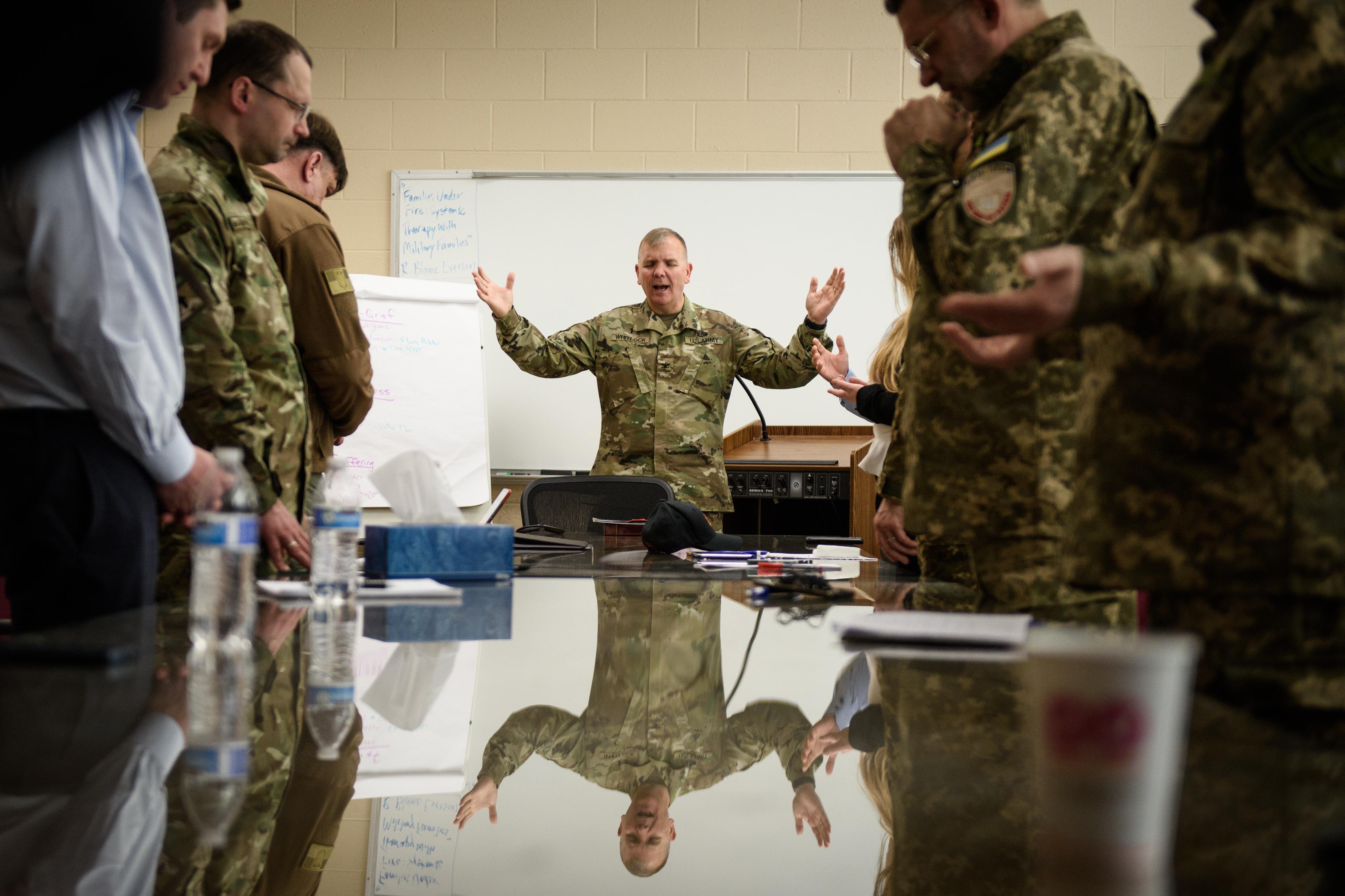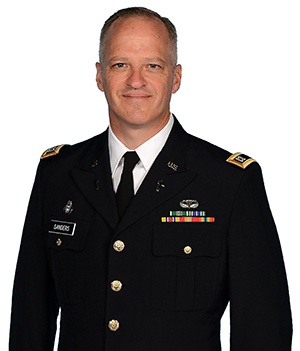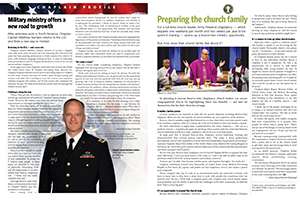
Chaplain (Colonel) Robert Whitlock prays with a group of Soldiers and Civilians. (Official U.S. Army Photo)
After extensive work in South America, Chaplain Captain Matthew Sanders returns to the U.S. and finds a new way to minister


United States Army SE Chaplain Recruiting Team
Morrow, Ga.
Returning to the U.S. — and a new role
Chaplain Captain Matthew Sanders’ decision to become a chaplain came after many years of travel, and a lot of praying. His work until that point had been planting missionaries in South America for a total of 16 years, with extensive language training in Peru, 11 years in Venezuela, and a preceding two years in Uruguay. He decided to return to the U.S. and pursue military chaplaincy.
In the eight years of his chaplaincy work and in his current role within the United States Army SE Chaplain Recruiting Team, Morrow, Ga., Chaplain (Captain) Sanders has focused on providing support to Soldiers in both times of need and times of relative quiet during training and normal work tasks. “It’s a privilege to wear the cross (or your respective chaplain insignia) and uniform and be that person who represents the ministry,” he says. “It’s what you’re there for, and it’s your role amongst the Soldiers in your unit.”
Challenges along the way
“When I first got into the military, I had my sights set on active duty, and the age requirements allowed for it,” Chaplain Captain Sanders recalls. “However, the military drew back and reduced those requirements, so I no longer qualified for active-duty.”
With the active-duty option off the table, he entered the Reserves. While Chaplain Sanders found that the variety of assignments and travel have been a big positive in his role, it also means time away from family — something he lists as a tough aspect of the job, despite having his loved ones’ full support. After getting used to working alongside his family during his years in civilian ministry, it was a big shift to spend a lot of time away from them, once he transitioned into military service.
The tests and trials remind Chaplain Sanders of a Charles Spurgeon reference that speaks of being both salt and light: the preservation of meat by salt is akin to the availability of believers to seize opportunities that actively engage them in their ministry, including the Reserves.
“Even if you don’t qualify or can’t do active duty on a full-time basis, you can still be there, serving members of your community,” he points out. “I believe some people, in their heart, are attracted to this type of physically demanding work and the opportunity to sacrifice within their Reserve chaplaincy role. I think God has made chaplains that way.”

Although Reserve units don’t deploy as frequently as they used to, Chaplain Sanders says, the possibility is still present.
After coming from a conservative church background, he says he realizes there might be some misconceptions about U.S. military chaplaincy, and whether it is appropriate for ministers. “I think it’s exactly where we need to be,” he says. “The challenging work of ministering to Soldiers in the good and difficult times is a real opportunity. The minister will encounter situations and conversations that they would not normally hear within a civilian church.”
It is in these situations, that Chaplain Sanders especially highlights the importance of the presence of ministry. “Sometimes these situations may be uncomfortable; but that’s ministry. It’s being present with faith and available to any Soldier who has a need to talk. You need to be the source of hope and truth to them.”
Chaplain Sanders says he finds the military to be an ideal place for ministry, rather than somewhere where you need to compromise your beliefs, or question whether you can effectively minister from your beliefs.
“Be ready to learn”
For any church leader considering chaplaincy, Chaplain Sanders highlights how learning and growth are key aspects that he has had to embrace during his years of service.
“Walk with God and be willing to learn,” he advises. “In both the military and traditional ministry, you can get focused on the operational aspects of your role, and your spiritual walk with the Lord may end up growing cold. A lot of things in military chaplaincy do run parallel to civilian ministry, but there are also things that are unique to the military.”
In particular, the uniform, culture, training requirements and lines of authority all require some ability to adapt when transitioning to military ministry. “In a sense, you need to have a closed mind, in that your personal relationship to God has to be there and growing; but on the other hand, you need to be open-minded and ready to learn,” he juxtaposes.
It is necessary to be ready for that learning curve when becoming a chaplain. For the Army — and likewise, for chaplain officers — Chaplain Sanders states: “They like to put officers in situations where you have to figure things out. And you always have accountability.”
After his many travel experiences, he still relishes in the possibilities and growth that chaplaincy offers. “There is a lot of room for creativity and initiative. The exciting thing is that a lot of the ministry for chaplains is what you make of it.”
— Reporting by Joyce Guzowski
To learn more, visit GoArmy.com/Chaplain, call 1-888-550-ARMY (2769), or log on to GoArmy.com/locate-a-recruiter.html.


